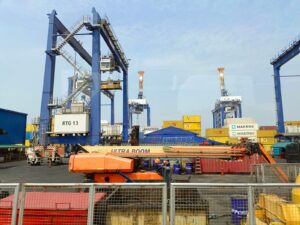How Swiss Companies Leverage Technology to Streamline Supply Chains
The Role of Technology in Swiss Supply Chain Management
Technology in supply chain management has become a game-changer for many Swiss companies, providing them with the tools needed to enhance efficiency and reduce costs. As businesses strive to keep up with the demands of the modern market, they are increasingly turning to advanced technologies such as artificial intelligence, blockchain, and the Internet of Things (IoT) to optimize their supply chains. By integrating these technologies, companies can gain better visibility into their logistics processes, predict potential disruptions, and make data-driven decisions that ultimately improve overall performance.
Swiss companies, known for their precision and commitment to quality, are at the forefront of adopting these innovations. For instance, companies in the pharmaceutical and manufacturing sectors are using AI-powered analytics to forecast demand more accurately, reducing the risk of overproduction or stockouts. This not only cuts down on unnecessary costs but also ensures that products are delivered to the market on time, enhancing customer satisfaction. The emphasis on technology in supply chain management aligns with Switzerland’s broader goals of sustainability and efficiency, making it a critical area of focus for businesses aiming to remain competitive on the global stage.
Furthermore, Swiss firms are leveraging blockchain technology to enhance transparency and traceability across their supply chains. By creating a decentralized and immutable ledger of transactions, companies can track the movement of goods in real-time, ensuring that all parties involved in the supply chain have access to the same information. This level of transparency helps in building trust with customers and suppliers, while also enabling faster resolution of disputes, thereby streamlining the entire supply chain process.
Cost Reduction and Efficiency Through Digital Transformation
Implementing technology in supply chain management not only enhances operational efficiency but also significantly contributes to cost reduction. Swiss companies are increasingly embracing digital transformation as a strategy to streamline their logistics operations, minimize manual errors, and optimize resource allocation. For example, by deploying IoT sensors and devices, companies can monitor the condition of goods in transit, track their exact location, and receive real-time alerts about any deviations from the planned route. This proactive approach allows businesses to address potential issues before they escalate, reducing delays and associated costs.
Another way Swiss companies are achieving cost reductions is through the use of automated warehouse management systems. These systems utilize AI and machine learning algorithms to optimize inventory levels, forecast demand accurately, and reduce the amount of capital tied up in stock. By automating routine tasks such as order picking, packing, and shipping, businesses can lower labor costs and increase productivity. Additionally, technologies like predictive analytics enable companies to identify patterns and trends in their supply chains, allowing them to make informed decisions that drive further efficiencies.
Digital transformation in supply chain management is not without its challenges, however. Swiss companies must navigate the complexities of integrating new technologies into their existing systems and processes. This often requires a significant investment of time and resources, as well as a willingness to adapt to new ways of working. Despite these challenges, the long-term benefits of enhanced efficiency, cost savings, and improved customer satisfaction make the investment worthwhile for many businesses. By prioritizing digital transformation, Swiss companies can position themselves as leaders in supply chain innovation, setting new standards for the industry.
Impact on Business Success and Future Outlook
The impact of technology in supply chain management on business success cannot be overstated. For Swiss companies, the adoption of advanced technologies has led to measurable improvements in key performance indicators such as order fulfillment rates, lead times, and cost-to-serve metrics. As these companies continue to invest in digital transformation, they are better equipped to respond to market fluctuations, manage risks, and capitalize on new opportunities. This agility is particularly valuable in today’s fast-paced business environment, where customer expectations are constantly evolving, and competition is fierce.
Moreover, the use of technology in supply chain management supports Swiss companies in their sustainability efforts, a growing priority in the global business landscape. By optimizing logistics and reducing waste, businesses can lower their carbon footprint and contribute to a more sustainable supply chain. For instance, AI-driven route optimization can minimize fuel consumption and emissions by selecting the most efficient delivery routes. Blockchain, on the other hand, enables greater accountability and transparency, helping companies ensure that their suppliers adhere to ethical and environmental standards.
Looking ahead, the future of supply chain management in Switzerland is poised for further transformation as emerging technologies such as robotics, autonomous vehicles, and advanced analytics become more mainstream. Swiss companies that continue to embrace these innovations will be well-positioned to drive even greater efficiency, reduce costs, and deliver superior value to their customers. The ongoing commitment to integrating technology in supply chain management will not only enhance business success but also reinforce Switzerland’s reputation as a hub of innovation and excellence in the global marketplace.
Conclusion
In conclusion, the integration of technology in supply chain management is revolutionizing how Swiss companies operate, enabling them to enhance efficiency, reduce costs, and drive business success. By adopting advanced technologies such as AI, blockchain, and IoT, Swiss firms are setting new benchmarks in supply chain performance, positioning themselves as leaders in a highly competitive global market. As the digital landscape continues to evolve, these companies will need to stay agile and adaptable, leveraging the latest innovations to maintain their competitive edge and deliver value to their customers. The future of supply chain management in Switzerland is bright, with technology playing a pivotal role in shaping the next generation of business excellence.
—
#supplychainmanagement #technologyinsupplychain #Swissinnovation #digitaltransformation #costreduction #AIinsupplychain #blockchaininsupplychain #efficiencyinsupplychain #supplychainoptimization #Swissbusiness












